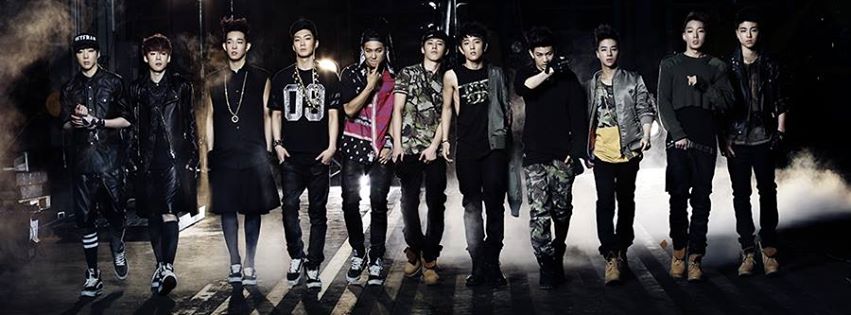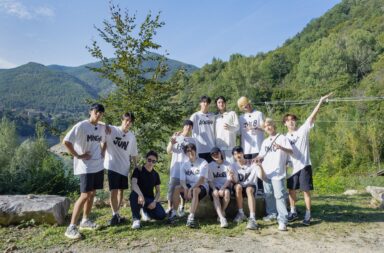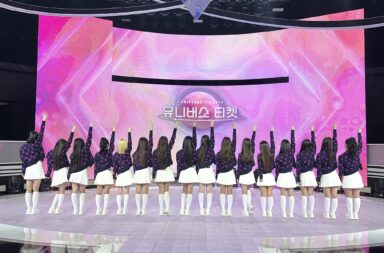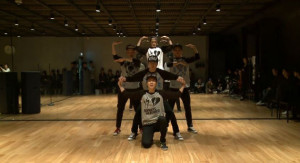
YG Entertainment’s reality show, Who Is Next: WIN (WIN) premiered on the 23rd of August 2013. This show follows the journey of two boy groups whom, at the end of a hundred days, will face judgment in the form of votes from TV voters. The group with the higher vote count will be guaranteed a debut immediately. Nevertheless, knowing YG, “immediately” doesn’t say much. The fate of the other group is unknown, with the possibility of being broken up and even let go from YG Entertainment.
A previous Seoulbeats article has already eloquently detailed why this is a bad idea, given YG’s influential position in the market. This is them giving even more acceptance to a toxic environment where trainees are subject to much exploitation, whether it is in the form of incredibly long hours or, in extreme cases, sexual abuse. Given the generally horrified reaction to YG’s announcement of this programme, it’s safe to say that most K-pop fans share the same sentiments, and do recognize how dehumanizing this programme will be for the trainees. But the fact is that interest in YG’s programme is high, and YG and Mnet knew it would be. It was. The first episode recorded a stunning 1.5% of cable viewership, much above the average of 1%. K-pop culture itself, through marketing the ethic of hard work, already is fertile ground for such a show to flourish.
Both episodes follow a similar format, with the episode structured around a monthly evaluation. During this evaluation, each group has to present two items, a song item and a dance item. The fallout from this evaluation can be harsh; as a YG trainee says, one can be easily cut from the training programme if one does not make the cut for a particular month. Trainees coming and going constantly is very routine. Around this point of tension does the rest of the episode revolve; we see how the pressure ramps up as the groups attempt to come up with good enough song and dance items. Team B seems to be doing fine here, while Team A struggled a bit with their items. It’s only two episodes in and we already have the standard crumbling-under-stress experiences every episode with trainees breaking down and crying or flaring up at one another.
Another constant in the episodes is the introduction of a trainee’s parents. Some, like Jinwoo from Team A, have not gone home in three years, even though his home is on Imja Island, an island off South Korea’s coast. The camera makes sure to pan close, to capture these shots of trainees crying and their family tearing up for them and the hardships they are going through as well.

K-pop’s infamous training regiments, especially for trainees who are not protected by proper contracts, are not even an open secret – they are almost a badge of pride. The BBC’s documentary on Nine Muses paints an unforgiving picture of Star Empire, the company that manages Nine Muses. The terms of agreement between Star Empire and BBC are not clear, but it’s nothing short of amazing that BBC can be allowed to publish a documentary that shows how offensively exploitative, dehumanizing and sexist Star Empire’s training methods are. Their CEO engages in nothing short of verbal abuse, and the slow breakdown in friendship and camaraderie amongst the members is heartbreakingly charted alongside the inhuman working conditions inflicted upon them. Al Jazeera’s report on Rania is also startlingly honest, and again, it’s company-approved. YG’s WIN isn’t that different in this sense, because it also profits, as shown above, from demonstrating how trainees fight for survival under such training regimes.
The point to be made is that such things sell because they are marketed as showcases of the individual’s (or more precisely, the groups’) struggle for success. People lap up stories of idols working hard, of them pushing themselves day after day, schedule after schedule. Who hasn’t heard of the term hard work? The usual phrase that comes out is that “we will work harder than ever to repay your love”. In the K-pop fandom, most of the time, the drive of the idols and their ability to endure hardships is the key reason behind people appreciating them and what they do.
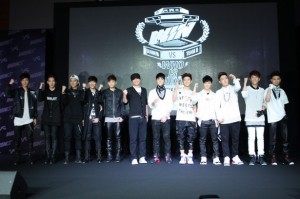
This ties in strongly with the support that people offer idols. K-pop is not and never is just K-pop for dedicated fans; K-pop is personality, a story behind music produced. For example, Big Bang’s Alive came roaring out with the desire to escape the scandals that they went through the previous year, and VIPs responded explosively to the message in songs like “Blue” and “Still Alive”, which dealt with the theme of overcoming hardships after a long struggle. Watching idols, most recently EXO and Crayon Pop, cry on the winning stage of their first music show win or on award platforms is also an emotional experience for the fan because of the perceived hardships these idols had to go through to get to where they are.
Let’s make a distinction here–hard work is fine. Respecting people who work hard is fine. Almost everyone in any industry has to work hard to get where they are in life, unless you have inherited wealth or connections. But respecting idols working hard needs to come with a caveat, which is that we are respecting them for working hard in a system which exploits and drives them to work so hard. Reflecting on the differences between the music system in Thailand and Korea, Joy of Rania notes that “In Korea, everything must be perfect. All day like twelve hours, you have [to] stay in the practice room. Before you debut, you don’t have phone [privileges]. We cannot call or hang out with friends. Of course no boyfriend.”
And this is for trainees who have not even debuted yet. The trainees in WIN deal with school, family, and travelling often long distances or shuttling between countries without the promise of debut, or even much job security. Their personal life is regulated to an extent which is actually really intrusive, with cameras on them 24/7, and all these being told to them without explicitly asking for their consent. It is assumed that they should consent to be monitored by cameras 24/7, being broadcasted over national and international media and having their career decided in a 100 days without prior discussion with them. Because they want to debut, and it follows the logic that hard working and determined people will do whatever it takes to debut. If that doesn’t say anything about the K-pop industry, I don’t know what else does. Of course, there could be negotiation going on behind the scenes, but this is how YG portrays it and that’s how I’m going to take the process.

To be fair, trainees do sign up for this because they think that this is what they want. And for those successful ones, it might be entirely worth it (even if it is doubtful that they really understand at such a young age what they are signing their life away for). But it does not have to be this case. Proper regulation on, say, the number of hours trainees can put in per week, or the number of hours idols can work in a day, can go a long way. More protection for the idols in terms of fairer contracts, which obviously can come, as seen by the changes made in the shockwaves after Hangeng and JYJ left SM Entertainment.
Hard work is usually used to distinguish one individual from another. Watching YG Entertainment’s WIN, I’m not sure how any distinguishing factor can be made, because all of them work ridiculously hard. That can be applied to the industry at large – name me a lazy idol. If people work hard because working so hard is a baseline applied by a structurally unequal and predatory industry, can hard work still be a value prized by fans who look up to K-pop idols for their work ethic? Not without a tinge of guilt. YG’s WIN is going to be a hit, no doubt, and we’re all guilty of having a hand in it.
